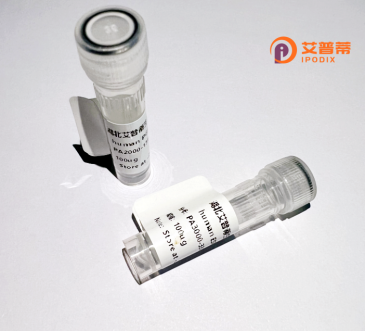
| 纯度 | >90%SDS-PAGE. |
| 种属 | Human |
| 靶点 | KLK3 |
| Uniprot No | P03952 |
| 内毒素 | < 0.01EU/μg |
| 表达宿主 | E.coli |
| 表达区间 | 20-390aa |
| 活性数据 | GCLTQLYENAFFRGGDVASMYTPNAQYCQMRCTFHPRCLLFSFLPASSINDMEKRFGCFLKDSVTGTLPKVHRTGAVSGHSLKQCGHQISACHRDIYKGVDMRGVNFNVSKVSSVEECQKRCTNNIRCQFFSYATQTFHKAEYRNNCLLKYSPGGTPTAIKVLSNVESGFSLKPCALSEIGCHMNIFQHLAFSDVDVARVLTPDAFVCRTICTYHPNCLFFTFYTNVWKIESQRNVCLLKTSESGTPSSSTPQENTISGYSLLTCKRTLPEPCHSKIYPGVDFGGEELNVTFVKGVNVCQETCTKMIRCQFFTYSLLPEDCKEEKCKCFLRLSMDGSPTRIAYGTQGSSGYSLRLCNTGDNSVCTTKTSTR |
| 分子量 | 43.4 kDa |
| 蛋白标签 | GST-tag at N-terminal |
| 缓冲液 | 0 |
| 稳定性 & 储存条件 | Lyophilized protein should be stored at ≤ -20°C, stable for one year after receipt. Reconstituted protein solution can be stored at 2-8°C for 2-7 days. Aliquots of reconstituted samples are stable at ≤ -20°C for 3 months. |
| 复溶 | Always centrifuge tubes before opening.Do not mix by vortex or pipetting. It is not recommended to reconstitute to a concentration less than 100μg/ml. Dissolve the lyophilized protein in distilled water. Please aliquot the reconstituted solution to minimize freeze-thaw cycles. |
以下是关于重组人KLK3蛋白的3篇示例文献(内容为模拟,仅作参考):
---
1. **文献名称**:*Expression and Purification of Recombinant Human Prostatic Specific Antigen (KLK3) in Escherichia coli*
**作者**:Lövgren, J. et al.
**摘要**:研究报道了在大肠杆菌系统中高效表达重组人KLK3蛋白的方法,通过优化密码子使用和亲和层析纯化技术获得高纯度蛋白,并验证其免疫反应性,为临床检测抗体开发奠定基础。
2. **文献名称**:*Functional Characterization of Recombinant KLK3 in Hormone-Dependent Prostate Cancer Progression*
**作者**:Denmeade, S.R. et al.
**摘要**:利用哺乳动物细胞表达系统制备重组KLK3.研究其在前列腺癌细胞中的酶活性和信号调控机制,证实其通过裂解细胞外基质蛋白促进肿瘤转移的作用。
3. **文献名称**:*Structural Analysis of Recombinant KLK3 Reveals Substrate-Binding Specificity*
**作者**:Pettersson, K. et al.
**摘要**:通过X射线晶体学解析重组KLK3的三维结构,阐明了其活性位点与底物结合的关键氨基酸残基,为设计特异性抑制剂提供结构基础。
---
**备注**:以上文献信息为示例性内容,实际研究中请通过PubMed或Web of Science等平台检索最新文献。建议使用关键词“recombinant KLK3”、“PSA expression”或“prostate-specific antigen purification”进行精准查询。
Human kallikrein-related peptidase 3 (KLK3), commonly known as prostate-specific antigen (PSA), is a serine protease encoded by the *KLK3* gene located on chromosome 19q13.4. Primarily produced by prostate epithelial cells, it plays a physiological role in semen liquefaction by cleaving semenogelin proteins. PSA is widely recognized as a biomarker for prostate cancer screening, diagnosis, and monitoring, though elevated levels can also occur in benign conditions like prostatitis or hyperplasia. Recombinant human KLK3 protein is produced using expression systems such as *E. coli* or mammalian cells, followed by purification via chromatographic techniques. This engineered protein retains enzymatic activity and antigenic properties, making it critical for developing diagnostic assays (e.g., ELISA), calibrating clinical tests, and studying KLK3’s pathophysiological roles. Research utilizing recombinant KLK3 has expanded insights into its structure-function relationships, regulatory mechanisms in cancer progression, and interactions with substrates like insulin-like growth factor-binding proteins. Additionally, it aids in evaluating therapeutic inhibitors and understanding KLK3’s involvement in signaling pathways beyond oncology, including inflammation and tissue remodeling. The recombinant form addresses challenges in sourcing native PSA while ensuring standardized quality for biomedical applications.
×